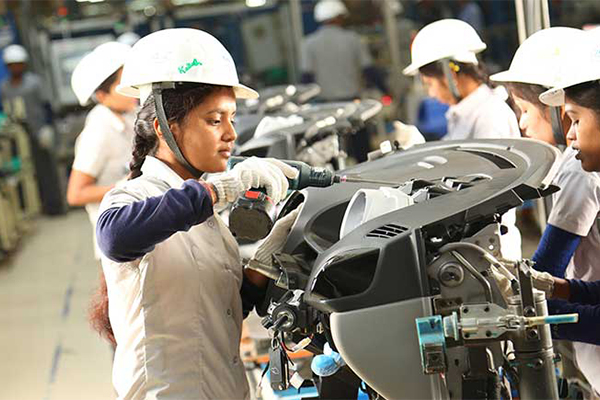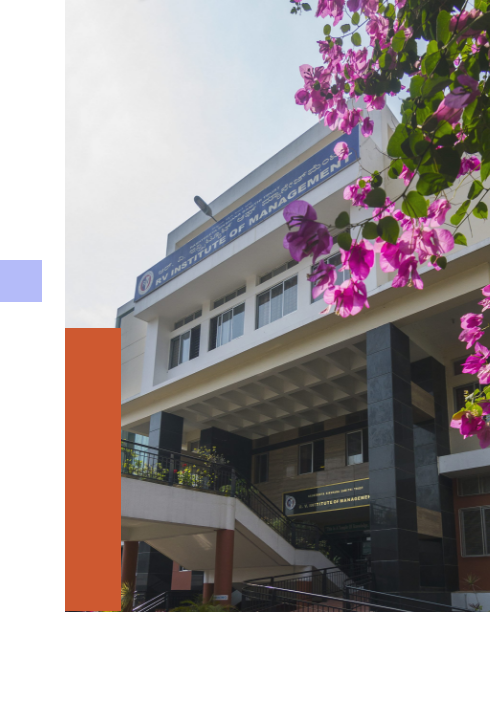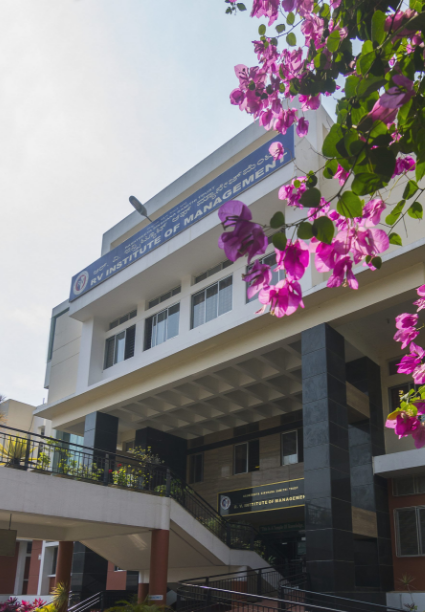
RVIM RESEARCH BULLETIN
VOL 2, ISSUE 1 | June 2025
A snapshot of the cutting-edge research work produced by the faculty members at the RV Institute of Management

Does the Exploring the Dynamics of Flexible Work, Digital Platforms, And The Sharing Economy: A Multifaceted Examination of Security, Trust and Risk
Dr. Purushottam Bung
This study explores how flexible work arrangements, digital platforms, and the sharing economy shape user perceptions of security, trust, and risk. Using surveys, user experiences, and case studies, findings show that trust and perceived security strongly influence participation and satisfaction, with transparency and clear protocols reducing risks. In healthcare, stronger security and transparency foster engagement, while broader insights reveal the importance of platform design and user interaction across various sectors, offering frameworks for understanding user behaviour in today’s digital economy.
Keywords: Flexible Work, Digital Platforms, Sharing Economy, User Security, Trust, Risk Perceptions.

Holistic Resource Management Based on AI and Sustainable Cloud Computing
Dr. Noor Firdoos Jahan
The widespread demand for hosting application services in the cloud has been fueled by the global deployment of cloud data centers (CDCs). Furthermore, the resource needs of modern apps have sharply increased, especially in businesses that utilize large amounts of data. Cloud providers prioritize reducing the energy usage of servers within cloud computing networks to lower operational costs and enhance service sustainability by consolidating applications onto fewer working servers.
Keywords: Cloud Data Centers (CDCs), Sustainable Cloud Computing, Resource Scheduling, Cuckoo Optimization, Energy Efficiency, Reliability, Service Consolidation, CloudSim.

Analyzing Twitter and YouTube Posts for Identifying Influencers of Apple Products in the Bangalore Region: A Comprehensive Study with Sentiment Analysis
Dr. Purushottam Bung, Dr. Noor Firdoos Jahan Dr. M Jahnavi N Nagasubba Reddy
This study explores influencer effectiveness, website analytics, and social media sentiments in shaping Apple’s digital marketing within Bangalore. Using SimilarWeb audits and sentiment analysis, it identifies authentic, relevant influencers and engagement drivers. Findings highlight adaptation to evolving trends, guiding strategies to enhance audience connection and brand resonance.
Keywords: Influencer Marketing, Website Analytics, Social Media Sentiment, Apple Products

Challenges in Talent Retention Amid adopting new manufacturing practices in the Automobile sector of Chennai.
Dr. J Krithika
Chennai, the “Detroit of Asia,” plays a crucial role in India’s automobile sector, facing challenges in retaining employees amid organizational changes. Based on 400 respondents through convenience sampling, the study used ANOVA and regression analyses. Findings reveal that providing employees time to adapt and fostering strong interpersonal relationships significantly enhance retention, while unrealistic performance expectations and external opportunities pose major challenges for employers.
Keywords: Automobile sector, Chennai, Employee retention, Employer challenges, Talent management.

Unleashing Agricultural Potential: A Comprehensive Review of Big Data Analytics for Enhanced Productivity and Sustainable Farming Practices
Dr. Vinay K S, Dr. Noor Firdoos Jahan
This paper looks at how big data can transform agriculture. Although it’s already changing other industries, farming hasn’t fully adopted it yet. The authors reviewed 34 studies, examining challenges, solutions, tools, and algorithms. They show how machine learning and AI can make farming smarter and more productive. But they also point out that agriculture is still in the early stages, with barriers that need to be overcome.
Keywords: Big Data Analytics, Precision Farming, Agricultural Ecosystems.

Unlocking the Value of Artificial Intelligence in Human Resource Management Through Effective Implementation and Usage
Dr.Anupama K Malagi
This paper presents the results of a survey on the "Usage and Implementation of AI for Talent Management in the Sector." Furthermore, the research indicates that implementing AI in personnel management and acquisition can yield substantial improvements in organizational outcomes. Majority of respondents were optimistic about AI's influence. Overall, this study gives useful information about the prevalence and impact of artificial intelligence in talent management and acquisition.
Keywords: Talent management, recruitment bias, future workforce needs, talent retention, employee development

Dynamic Market Dependence between the Indian Market and Other Asia-Pacific Markets: Evidence from Multivariate DCC GARCH and Copula Model.
Dr. Tamizharasi D
The study examines the dynamic dependence structure between the Indian market and other emerging and developed Asia-Pacific markets. We used the Copula-based Multivariate GARCH model to analyze the Conditional Correlation by Multivariate Generalized Autoregressive Conditional Heteroskedastic (MGARCH). The study considered daily indices data from March 04, 2003, to December 31, 2023. The study found that there is a significant dynamic dependency among the Indian market and other Asia-Pacific markets.
Keywords: Dependence structure, Indian market, Asia–Pacific market, copula.

Comparing Econometric and Machine Learning Models for Gold Price Forecasting: A Comprehensive Approach
Dr. M Jahnavi, Dr. Purushottam Bung, N Nagasubba Reddy
This study compares econometric and machine learning models for predicting gold prices in India from 2010–2023. Using factors like inflation, exchange rates, GDP, and stock indices, model performance is assessed through RMSE, R², AIC, BIC, and MAPE. Results reveal econometric models outperform machine learning in predictive accuracy.
Keywords: Gold Prices, Econometric Models, Machine Learning, Prediction Accuracy

Case Study on Areca Tea: changing consumer perspectives for Sustainable well being
Dr. Tamizharasi D
The case study “Areca Tea: Sustainable Well Being” could serve as an educational tool to explore various dimensions of sustainability, business innovation, health considerations, cultural aspects, and marketing challenges within the context of a unique product like Areca Tea. It provided insights into how companies can navigate these complexities to create and promote a sustainable product.
Keywords: Entrepreneurship, marketing challenges, health benefits, sustainability

Seeing is Believing: The Impact of Augmented Reality on Customer Shopping Behavior of Lenskart in Bangalore
Dr. Noor Firdoos Jahan
The impact of Augmented Reality on sales has been a subject of growing interest, particularly in the retail sector. Augmented Reality technology offers immersive and interactive experiences that can positively influence consumer behavior and purchasing decisions. This study investigates the effects of Augmented Reality (AR) technology on consumer perceptions, engagement, and purchasing behavior at Lenskart stores in Bangalore.
Keywords : Augmented Reality (AR), Consumer Behavior, Customer Engagement, Brand Loyalty.

AI-Powered Predictive Maintenance for Electric Vehicle Fleets
Dr. Vinay K S
This paper introduces a predictive maintenance system for electric vehicle fleets using AI, IoT, and machine learning. Unlike traditional reactive or scheduled repairs, the system analyzes real-time data to detect faults early. The study shows strong results—90% accuracy, 88% precision, 85% recall, and 86% F1-score—with fewer false alarms. Cross-validation confirms effectiveness, proving it can reduce downtime, improve reliability, and make fleet management more sustainable and cost-efficient.
Keywords : Training, Costs, Accuracy, Scalability, Transforms, Electric vehicles
About RV Institute of Management


A unique B-School that carries the flag of the Rashtreeya Vidyalaya (RV) Group of institutions academic excellence, R.V Institute of Management (RVIM) was founded in the year 1999. It is one of 23 leading educational institutions of national and international repute that are managed by the Restreeya Sikshana Samithi Trust (RSST), which is spearheading the cause of education in various fields since 1940. RVIM is an autonomous institution for excellence is approved by the ALL India Council for Technical Education (AICTE) New Delhi, affiliated to Bengaluru City University, and Recognized by Govt. of Karnataka. It is located in a state-of-the-art campus in Jayanagar, a beautiful and centrally-located suburb of the city of Bengaluru, India. RVIM offers a two-year full-time Autonomous Master of Business Administration (MBA) program (affiliated to BCU), and also offers many value addition programs in the specialized areas of Banking & Insurance, Entrepreneurship, Finance, Healthcare, Human Resources, Marketing, Business Analytics, Operations and Supply Chain Management. The institute focus on research and encourage and support both faculty and students to involved in research and contribute to the research output of the institute.
Dr. Purushottam Bung Professor and Director, RV institute of Management
Dr. Noor Firdoos Jahan
Professor, RV institute of Management
Prof. Nagasubba Reddy,
Assistant Professor, RV institute of Management